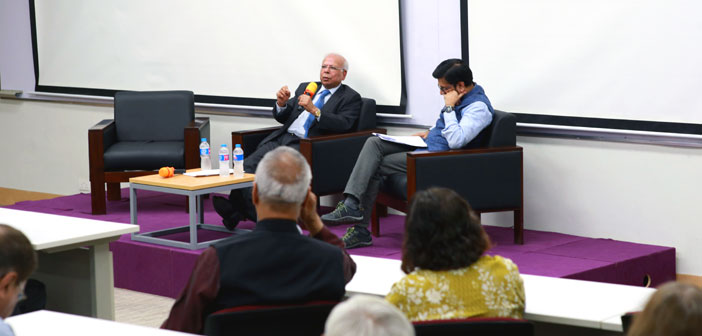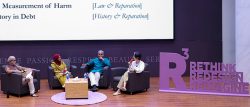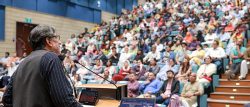An established banking career, author of 18 books, and former dean of IBA, Dr. Ishrat Husain was welcomed by Habib University to speak on the economy of Pakistan and to promote his book Governing the Ungovernable, which will be presented at the Karachi Literature Festival and eventually be available to all major university libraries free of charge.
He began by talking about governance and the responsibility each individual has towards the wellbeing of a country, and why we see Pakistan as ‘ungovernable’ or as a situation out of control. Until 1990, Pakistan was considered to be among the top ten performing developing countries on economic and social indicators. Then came a downfall. What caused this steady decline in Pakistan’s economic and social development?
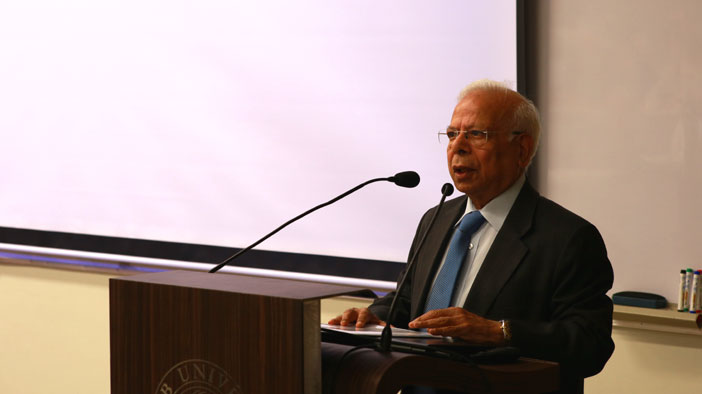
Contrary to popular belief, factors such as terrorism, foreign assistance, military rule, and global economic conditions are not the sole or even main reasons for the declining performance of the country. The real reason is the weakening of civilian institutions of governance.
We must not lose hope, however, that Pakistan is forever ‘ungovernable’. The audience at Habib University learned there are ways to salvage the current crisis through the reforms of some key institutions, as proposed by Dr. Husain. These reforms would create a positive change and not only help in restoring efficient and effective governance, but realign these institutions to envision the same original goal they were working on: with the goal to strive for integrity, dedicated service, and problem-solving, ensuring the future stability of democratic governance.
Dr. Husain also spoke about the main challenges Pakistan faced from 1947 to 1990, the first being the premature demise of its founder, Muhammad Ali Jinnah. The early days were crucial in setting a course for the country’s future, and the death of the founder had a greatly negative impact. The fact that Pakistan did not have a constitition until 1956 is the most prominent outcome. Other major hurdles hindering Pakistan’s progress were the eras of martial law, the war with India in 1965 which put immense pressure on the private sector of Pakistan’s young and budding economy, the seperation of East Pakistan, the rise in oil prices in the 1970’s, and finally the war with Afghanistan. Despite these challenges, Pakistan was still economically sound. But come 1990, there was a sharp decline in its stability.
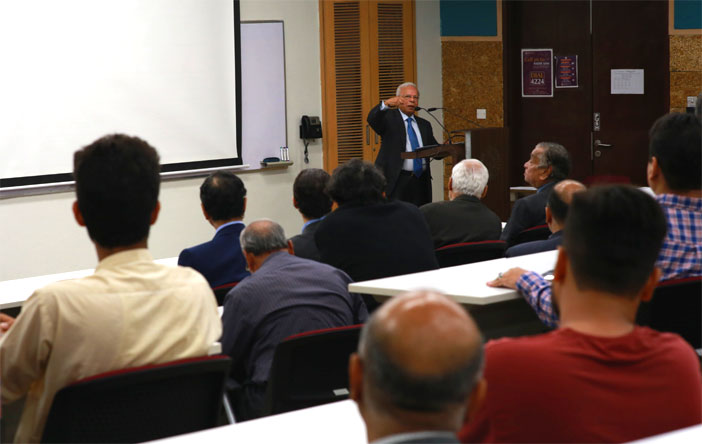
Dr. Husain, after extensive research, found some major factors that have hindered the economic success of Pakistan, the first being that Pakistan is a large state with huge budgets set aside for nuclear weaponry and military expenditure. Further research on the inflow of capital from international borders in military and religious dictatorshop eras concluded that there is no difference between the current and recent years, and previous years. Dr. Husain elaborated this point further by saying that people don’t realize that in Bhutto’s era the inflow of capital was greater than during Ayub Khan’s days, because of the good relations he had with the Middle East and development funds were coming in the form of grants, not loans. In the 90s, the citizens’ money was confiscated to pay off debts.
From 1990-2008, developing countries benefitted the most with per capita income increasing by 70%, poverty fell from 37% to 13%, exports increased from 24 to 41 billion. And in this period while Bangladesh and India tripled their marketshare, Pakistan’s went down. A final factor is that Pakistan is a garrison state and is gripped on competing with India, therefore allocating a large portion of its expenses to defense. To Dr. Husain, it is not about the expenditure but the management of the budget and allocation of resources that is important.
In Pakistan, there is a real issue of accountability. Honest officers hesitate to take action because they are afraid of the NAB, FIA, the media, and the parliamentary committee, while those who are corrupt are making a lot of money. And so, Pakistan needs an independent national accountability bureau, selected on the basis of certain principles and accountable for their performance. In Dr. Husain’s eyes, that should be the theme for all the institutions – getting the right person for the job, giving them the autonomy to run the institution and the resources, and holding them accountable.
He feels citizens should be empowered to take their own decisions, and that the Election Commission should be independent and autonomous, with public service commissions manned by people of the highest integrity, not people brought in on ‘sifarish’, but on the basis of capability.
Dr. Husain praised Habib University and proudly spoke of the HU students who were selected for public service commissions purely on the basis of their capability and merit versus other students who are often selected because of connections with specific politicians.
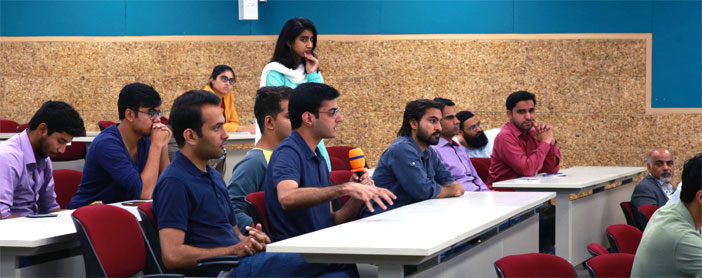
Dr. Ishrat Husain concluded by saying he hoped the 2017 census would provide us with enough evidence that can be used by educated Pakistanis to demand a better delivery of services and the creation of pressure on their representatives to do so. If done, by 2023 the sixty million (and growing) educated can achieve and have a lot more. The talk ended after an insightful question and answer session, in which Dr. Ishrat urged the youth to go out and excersize their vote towards the party it feels will improve the conditions of one’s city and country.

